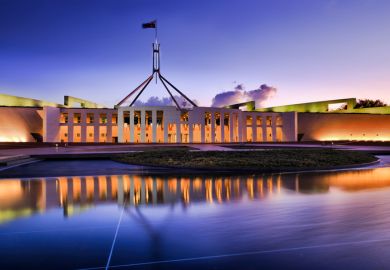Australian educational leaders have extracted a guarantee that proposed institutional caps on overseas enrolments will not be imposed before next year, according to the head of the federal government’s expert advisory group on international education.
But the caps will nevertheless be applied long before universities can meet government demands for more student housing.
Phil Honeywood, convener of the Council for International Education, said attempts to develop off-campus housing risked being stymied by the “whims” of local and state government planning regimes.
He cited Randwick City Council’s recent rejection of UNSW Sydney’s proposal to develop new accommodation blocks, which could house more than 1,000 students, on a “derelict” car park across the road from its Kensington campus.
“Even if a project’s going well, it takes three years to get it shovel-ready nowadays,” Mr Honeywood said.
Campus housing developments also face challenges because of investors’ reluctance to plunge money into facilities on land legally owned by state governments, he added.
“Overseas pension funds own the big PBSA [purpose-built student accommodation] companies. Unless they can lock in some guarantees from universities about land use, then why would they put a A$100 million dollar [£53 million] facility on land owned by the university? What happens to the building if the government decides, theoretically speaking, that they want to use the land for other purposes?”
Mr Honeywood said council members had met four federal ministers on 13 May to convey the sector’s “incredible angst” over the proposal, which had emerged without warning two days earlier.
According to a draft International Education and Skills Strategic Framework, the “international student profiles” set at each university will limit their foreign enrolments over nominated time periods.
Factors influencing the profiles will include accommodation, with institutions permitted to exceed their enrolment limits if they establish “additional, newly built supply” of PBSA, and the “contribution of enrolments to meeting Australia’s skills needs”.
The framework proposes enrolment limits within specific courses or campuses as well as at institutional level. “These powers will enable government to implement a managed system to deliver sustainable growth over time, in consultation with the sector,” the document says.
It says the growth will be “carefully managed”, with higher education enrolment levels determined by the minister for education and the skills minister allocating caps in vocational training.
The Independent Tertiary Education Council Australia (Iteca) said the “command-and-control approach” would give the government the power to tell institutions what they could teach and students what they could study. Iteca said the strategy was driven by “short-term populism” and “tenuous links” between migration and housing costs, and would cost jobs at more than 1,000 colleges.
Australian National University policy expert Andrew Norton criticised the plan to align international enrolments with Australian skill shortages. “Most students go home after finishing their degrees,” he tweeted. “They should be able to take whatever courses match their own interests and career plans.”
With the proposal likely to constrain universities’ international education revenue, vital for supporting underfunded or unfunded activities like research and infrastructure construction, the 14 May federal budget will be closely watched.
Federal government funding covered just 46 per cent of universities’ expenses last year, down from 50 per cent the year before the pandemic, according to the financial accounts of the 20 universities that have so far released their 2023 annual reports.
Register to continue
Why register?
- Registration is free and only takes a moment
- Once registered, you can read 3 articles a month
- Sign up for our newsletter
Subscribe
Or subscribe for unlimited access to:
- Unlimited access to news, views, insights & reviews
- Digital editions
- Digital access to THE’s university and college rankings analysis
Already registered or a current subscriber? Login










